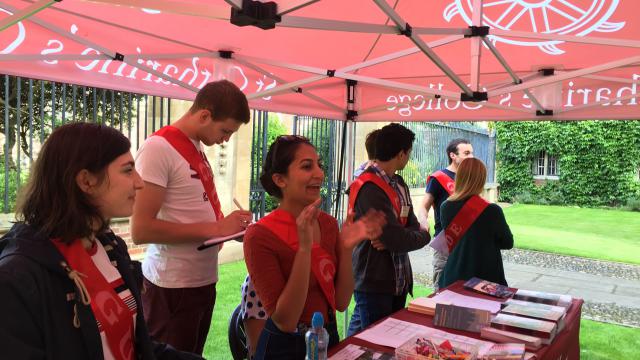
We were shocked and saddened to hear today of the death of Chris Bayly, longstanding Fellow of this College and now an Honorary Fellow, who died yesterday (Sunday 19 April) of a suspected heart attack whilst on one of his annual Spring visits to the University of Chicago.
Tributes to Chris as a person and to his scholarship are already pouring in. It is clear that he was held in high esteem not only in Cambridge and St Catharine's, but around the world. We have lost a friend and valued colleague, and he will be sorely missed.
We extend our deepest sympathy to Susan and his family.
Jean Thomas
Master
You can read a tribute to Chris from fellow historians Professor Chris Clark (Fellow) and Dr John Thompson (Emeritus Fellow) below.
Professor Sir Christopher Alan Bayly (1945-2015)
The College is mourning the loss of Professor Sir Christopher Bayly, LittD, FBA, who died of a heart attack on 19 April at the age of 69. He was at the time in Chicago, where since 2013 he had held the Swami Vivekananda Visiting Professorship at the University of Chicago. He was a world-renowned historian whose work transformed two fields of historiography – the history of South Asia and world history. Since his unexpected and shocking death, tributes have been appearing in newspapers not only in India but also France, Germany and the United States as well as in this country.
Chris Bayly made his whole career at St Catharine’s, arriving from Oxford (where he took his BA and DPhil) when he was elected in 1970 to a Fellowship and College Lectureship in History and became Director of Studies in History, a post he held until 1992. It was in these years that he researched and wrote the works on South Asian history that established his scholarly reputation. His work presented a fresh and rich perspective on the nature of Indian society in the eighteenth and nineteenth century and the intricacy of its interactions with British imperial power. Rulers, Townsmen, and Bazaars: North Indian society in the age of British Expansion, 1770-1870 (1983) in particular, has established itself as a classic work of pioneering scholarship. In 1981, Chris Bayly was elected to the Smuts Readership in Commonwealth Studies, and thereafter he was appointed to a succession of posts in the Faculty of History, culminating in his election as Vere Harmsworth Professor of Imperial and Naval History in 1992. He retired from the Faculty in 2013, and since then has held a professorship at Queen Mary University, London.
From the 1980s, the scope of Chris Bayly’s work broadened out not only geographically but also thematically as he came to pay more attention to cultural and intellectual developments and interactions. He also became even more productive, publishing no fewer than eight books (two co-authored with Tim Harper) between 1988 and 2011. Imperial Meridian (1989) marked a transition from highly textured work on the Indian sub-continent to a new kind of history focused on how the interactions between great imperial power complexes shaped and was shaped by processes of change within them. The most historiographically significant work in this mode was The Birth of the Modern World: global connections and comparisons, 1780-1914 (2003), which not only did much to establish world history as a scholarly discipline but also altered the conceptual framework of the subject by de-centering the West. No one who reads his books can fail to be impressed by the subtlety and lucidity of the reasoning, the breadth of compass, the attention to reciprocity in political, economic and social relationships and the well-oiled analytical gears that enabled Chris to travel elegantly between the local and the global. In 2005, Bayly won the Wolfson Prize for History for his lifetime achievements and in 2007 he was knighted “for services to history outside of Europe.”
Chris Bayly was not just an incomparable master of his discipline, but also a generous and unassuming friend and mentor. In his room at C3 on Main Court, crowded with artefacts from India, Afghanistan and Venice, Chris always found time for conversations – an open bottle of good wine always seemed to be handy -- that never failed to take his guests to new places. It seems extraordinary in retrospect that such an eminent figure should have been so generous and unassuming in his friendships. His influence was not confined to his scholarly work but also came from his role in guiding and nurturing younger scholars. These came from many countries and many now hold academic positions across the world. After he had declined the offer by his former students to produce a Festschrift, instead a conference was organized to honour his achievements earlier this year in Varanasi. It was a fitting acknowledgement: it was on the stone bathing wharves (ghats) of this beautiful, thronging city that the young Chris Bayly had begun his research into the mercantile elites of northern India.
Christopher Clark and John Thompson



